Read Reviews of At Home in the New World:
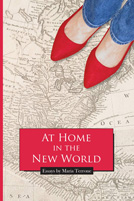 The Common The Common
"Terrone recreates for the reader the urban environment she grew up in and loves. Reading Terrone's essays, filled with honesty and vulnerability, I began to feel fortunate for the chance to know her."
Litro
"From stifling subway rides to lunchtime escapism in a shoe shop, through her first trip to Sicily and a glorious love letter to a golden shawl bought on her Spanish honeymoon, Terrone has the power to pick the reader up and transplant them into her world."
At the Inkwell
“Written in conversational prose and driven by a lyrical imagination...these essays position her as an observer, a historian and a poet."
Queens Chronicle (feature story)
"The title essay was based on her piece commissioned by the Guggenheim Museum, which she considers 'a turning point for me as a writer.'"

Read Reviews of Eye to Eye:
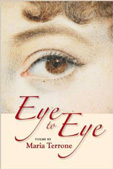 The Common The Common
“If the unifying theme of Terrone’s book is seeing, then Terrone sees the world in all its blemished and brutal multiplicities."
At the Inkwell
“Eye to Eye is a wonderful book and what is more, an exciting journey. The best poems are those in which Terrone lets her subconscious take over as the reader is guided through memories and dreams to the exquisite landscapes of her imagination."
Book Slut
“…Terrone’s concern with art and her technical acumen recall Dana Gioia and John Hollander; her unflinching observation of human frailty and the wages of transcending it bring to mind Tracy K. Smith and the recently departed Claudia Emerson."
Poets' Quarterly
“Eye to Eye is packed with gravitas…On the flip side, it’s also brimming with levity and quick wit, polished to a brilliant sheen, with stories of trips to Italy, birds and nature, social media and modern technology."
Washington Independent Review of Books
“Whether philosophically, politically, or personally, Terrone reveals our vulnerabilities with intellectual fire and a hope for the future.”
Poet Nicole Cooley Comments at National Arts Club Book Launch, June 4, 2014
“These poems continually explore what lies beneath the surface, what might at first appear to be invisible. Beneath a buried volcano, inside a jewelry box, on the label of a piece of clothing, at the edge of a tatted handkerchief…Again and again, this book pays tribute to sight and vision and asks us as readers and viewers to see beyond the world we live in.”

Read Reviews of American Gothic, Take 2:
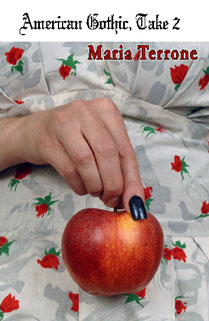 Rain Taxi Review Rain Taxi Review
“As other personae do here, she manages to redeem violent or violated language through the whimsical humor that also animates Terrone’s earlier collections.”
Italian Americana (review of American Gothic, Take 2 and A Secret Room in Fall)
“With the publication of her second and third collections, Maria Terrone confirms her growing reputation as an inspired singer of the complexities of contemporary life.”

Read the Reviews of A Secret Room in Fall:
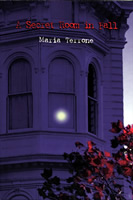
The Montserrat Review
"It is not merely unity and choice of theme, but the resonance and surprise of Terrone's writing that makes this a terrific book."
Notre Dame Review
"Maria Terrone's second volume of poems fulfills the promise of her first...her poems reveal a mind with a strangely original take on life."

Pen American Center Interview with Daniela Gioseffi
QUESTION:
"Who was the best new writer you read this year?
ANSWER:
Daniel Thomas Moran, Poet Laureate of Suffolk County and Maria Terrone, A Secret Room in Fall, Poems, Ashland Poetry Press, Ohio, 2006."

RHINO 2007
"This impressive book of well-crafted poems...invites the reader into multiple 'secret' rooms..."
A SECRET ROOM IN FALL, Maria Terrone, Ashland Poetry Press, Ashland
University, Ashland, OH, 44805, 2006, 83 pages, $13.95
This impressive book of well-crafted poems, introduced by Gerry LaFemina,
won the Robert McGovern Prize, which honors a co-founder of Ashland
Poetry Press. With straightforward language, a range of topics, and a flexible
“I,” these poems invite the reader into multiple “secret” rooms. In “The
Robust Young Man Discusses His Burial” (from RHINO 2003), the speaker
waits in vain beside a Manhattan pay phone. In “How Dolls Are Made,”
she is “drawn by a machine hum / down a narrow street to a doorway” where
plastic body parts are handled by nightshift men, reminding her of “the
first sense of self in pieces, / a girl-child to be assembled / and shaped by
many hands.” Poems like “White” and “The Woman Ironing” use restrained
nostalgia to recapture states of acute longing and awakened compassion. In
contrast are clever poems like “String Theory,” in the shape of a spool, and
more topical poems on 9/11, Y2K, and the tsunami.
I particularly like Terrone’s close observation of visual art in this book. In
“The Distance Between Trees,” she looks at photographer Edward Steichen:
“A modern man, he allowed himself / one small, chemical intrusion and fixed /
a bar of light above groves somber as the century / just passed.” Lamenting
his shift from pure picture taking to advertising and the abstraction, she says,
“I’d like to leave him there, conjuring dawn / in his lab, before he learned
how to arrange / shadow so artfully…” It’s a dilemma she presents to herself,
working not only in free verse but with tight rhymes and subtle sonnets
that require “artful” attention. A favorite of mine here is “Resurrection in
an Initial ‘R.’” A note tells us it responds to an Easter scene painted in the
letter “R” in a Renaissance choir book, but, while not Plath-like, it is still a
Lady Lazarus poem. Scary as it is, it’s thrilling to read, “that tremolo of
throat, / wing-beat-back-the-night, / that bloody resurrection.”
-- Kathleen Kirk

WILLOW REVIEW Spring 2007
"Reading A Secret Room in Fall rekindles my wish that books of poetry would be as popular as the fiction and nonfiction that make the best seller list..."
Larry Starzec, review of:
A Secret Room in Fall. Poems by Maria Terrone.
The Ashland Poetry Press, Ashland University, Ashland,
Ohio. 2006. 78 pp.
This second book of poetry by Maria Terrone is winner of The Robert
McGovern Publication Prize by the Ashland Poetry Press. It is a deserving
collection. In the book’s introduction by Gerry LaFemina, he states,
“Today when sincerity and – for lack of a better word – heart seems to
be out of vogue in American poetry, a poet such as Maria Terrone seems
necessary, timeless.” I second that sentiment.
Reading A Secret Room in Fall rekindles my wish that books of poetry
would be as popular as the fiction and nonfiction that make the best-
seller list. It’s unfortunate that more of the reading public isn’t exposed
to such gracious and elegant language.
Some of Terrone’s poems have immediacy to them, as if you are
sitting in the next booth and are overhearing the urgent message of life’s
fellow travelers. Such is, for me, the title poem with its understated energy.
“…like a revelation: / summer is over. Farewell / to motives transparent /
as glass and the blankness of mind / you mistook for enlightenment.”
The smooth weaving of distinct image with abstraction gets both
sides of the reader’s brain working in concert, and it’s a wonderful
exercise.
The scope of subjects in this volume is varied, from Egyptian Queen,
to Y2K, to The Weather Channel Preacher, but it’s the language that
ultimately grabs you–lyrical, direct, available–like these lines from “Glass
and Pitcher,”
Just two objects standing not quite
side by side in lurid violet – the bruise
of another morning, the hue of dreams
that block your air. The table tips
forward, disturbing the planes
of domestic peace in this still life
(Paris, ’44) where the pitcher salutes
with its handle, a soldier who’s slipped
unnoticed, into the kitchen…
Terrone’s work doesn’t require a study of culture to be understood
and appreciated, rather it calls for attention to the detail of sound and
meaning that lurks in syllables and phrasing constructed with her sure
hand and fine ear, such as these lines from “The Woman Ironing,”
“…the muggy night pressing down / like a strict parent, but we’re
easing / back and forth over the books, / the boys, the longing, the
restless / leaves stirring and sighing.”
It’s the language and its sensibility, its careful construction that
makes these poems work and in the end makes me, rather than sing
their praises, say, “Read this book.”

Read the Reviews of The Bodies We Were Loaned:
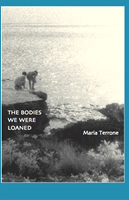 Fordham Magazine Fordham Magazine
"Springing from an ardent desire to bear witness to what has passed and what is passing, imbued with an acute sense of impermanence, the poems that fill The Bodies We Were Loaned are memorable and moving..."
ItalianAmericanWriters.Com
"Maria Terrone’s poems are well crafted and precise in their physicality as well as in their contemplative mood..."
Articles and Interviews Featuring Maria Terrone:
Il Regno, May 2, 2012
Interview by Olivia Kate Cerrone
Pirene's Fountain, May 2009
Featured Poet: Article and Q&A
|

